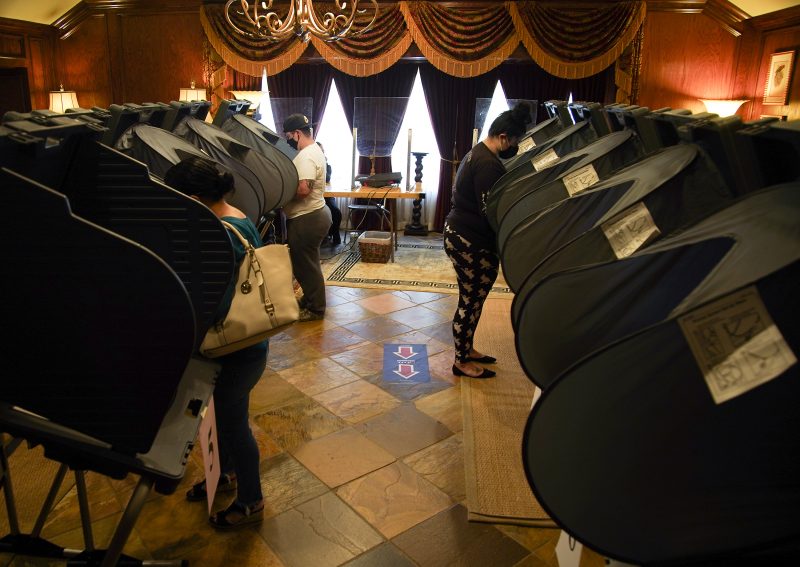Texas Republicans are advancing legislation that would allow state authorities to remove local election officials, designate marshals to investigate voting complaints and single out the state’s most populous county by giving it its own election rules.
One bill would change who oversees elections in Harris County, a Democratic stronghold that includes Houston and its suburbs. Another would give the secretary of state the ability to order a new election in the county if ballots are temporarily unavailable.
Republicans, who control the state legislature, say the measures are in part a response to problems last year in Harris, where about 10,000 ballots weren’t immediately counted in one election and in another some polling places ran out of ballots. Opponents decry the legislation as an attack on voting in a community where the majority of residents are people of color.
“I think it would make a mockery of our democracy,” Harris County Commissioner Rodney Ellis (D) said of the legislation. “It would be a throwback to the forties and fifties.”
Voting rights advocates say they are particularly concerned that one of the bills could cause chaos in future presidential elections by throwing the status of Texas’s electoral votes into doubt.
But state Sen. Paul Bettencourt (R), whose district includes part of Houston, said changes in Harris County are necessary because of dysfunction in last year’s primary and general election.
“I think people realize that Harris County is not too big to fail, but too big to ignore,” he said.
About 4.8 million people live in Harris County, making it more populous than 26 states. The sprawling county over recent decades has shifted from reliably Republican to solidly Democratic. Joe Biden won the county’s presidential vote by 13 points in 2020 even as Donald Trump triumphed by nearly six points statewide.
The elections measures are moving forward as Republicans in Texas and other red states seek to constrain officials on multiple fronts in overwhelmingly Democratic urban areas.
GOP lawmakers in Texas are finalizing legislation that would overturn local environmental and worker regulations that go further than what’s in state law. In Florida, Gov. Ron DeSantis (R) last year suspended an elected Democratic prosecutor who spoke out against criminally charging abortion providers. Texas Republicans are now considering legislation that would create a way to remove elected prosecutors who take similar stances, and Georgia Gov. Brian Kemp (R) signed such a bill this month — a move Democrats denounced as an anti-democratic power grab.
The raft of election legislation in Texas comes less than two years after Gov. Greg Abbott (R) signed a sweeping bill that toughened penalties for violating voting laws, barred 24-hour voting and drive-through voting, banned local officials from sending unsolicited applications for mail-in ballots and allowed partisan poll watchers to get closer to election officials.
Among the dozens of elections measures Republicans are now considering are ones that would give more power to Secretary of State Jane Nelson, an Abbott appointee. One would allow the secretary of state to order a new election in Harris County if more than 2 percent of its polling places ran out of ballots for more than an hour. Another would allow the secretary of state to use complaints filed against a county to justify temporarily overseeing its elections and eventually removing its elections administrator.
One piece of legislation would end a countywide voting system that has been used for years in some parts of the state that allows voters to cast ballots at any polling place, not just from their precinct. Supporters of the program say it makes voting convenient and ensures voters have a chance to vote if there are long lines or other problems at the polls. Opponents argue it makes it harder to audit elections.
Another bill would require local election officials to quickly provide comprehensive answers to questions from candidates, county officials and the chairs of political parties. If the answers are deemed unsatisfactory, the secretary of state could intervene and, after an audit, appoint a conservator to supervise elections there. Another proposal would allow the secretary of state to hire law enforcement officers who could investigate election complaints and impound ballots and voting equipment.
One of the bills written by Bettencourt would require Harris County’s elections to be overseen by the county clerk and county assessor instead of an elections administrator.
After the 2020 election, Harris County shifted the duties for elections from the county clerk and county assessor to a new office headed by an elections administrator. About half of Texan counties run their elections using administrators, who are appointed, and about half run them using county clerks and county assessors, who are elected.
In the March 2022 primary, Harris County didn’t have enough poll workers, faced issues with its voting machines and failed to count about 10,000 mail ballots on Election Day. The elections administrator resigned and was replaced.
In the November 2022 midterm election, new problems emerged. Some polling places opened late and some ran out of ballots, forcing voters to go elsewhere. Losing candidates have filed more than 20 lawsuits over how the election was conducted.
“It’s just preposterous that in the 21st century, [the] government puts on an election and can’t get ballot paper to the polls and thousands of votes are suppressed,” Bettencourt said.
Several factors played into the issues. In addition to having new officials in charge, the county was using new machines and adapting to new state laws. The county did not have a system for tracking problems at polling places that other jurisdictions use, making it harder to respond to the ballot shortage.
Harris County officials and their supporters have acknowledged the mistakes and said they had learned lessons to ensure future elections go more smoothly. Forcing the county to change who runs elections would only lead to more problems, they have argued.
Harris County Attorney Christian Menefee said he would consider bringing litigation as the county’s top civil lawyer if the measures singling out Harris County are enacted. The bills don’t mention Harris County by name, but one bill applies only to counties with populations above 2.7 million and another to counties with populations above 3.5 million. Only Harris County meets those thresholds.
Menefee compared the bills to the state’s recent takeover of the Houston school district and the bill that would provide a way to remove elected prosecutors.
“It’s all part of a theme,” he said. “The Republican Party in the state of Texas couldn’t win the hearts and minds of voters in Harris County, so now they’re trying to take that power by force.”
Chris Hollins, who oversaw Harris County’s presidential election in 2020 as the county clerk, said the new bills remind him of the Republican reaction to the 24-hour voting and drive-through voting programs that he set up. Lawmakers banned those practices less than a year after the election.
Hollins, who is now running to be Houston’s chief financial officer, said future elections should run better than the 2022 vote now that local officials have had a chance to review why problems occurred. Changing who is in charge of elections would lead to more turmoil, he said, noting the change would happen in September, just two months before an election for Houston mayor and other local offices.
“You’re just turning back the clock and setting us up for failure again,” he said.
Andrew Hendrickson, the government relations coordinator for the American Civil Liberties Union of Texas, expressed worries about how the bills would work in conjunction with one another.
The changes to who runs elections in Harris County could lead to problems in this fall’s mayoral election, he said. That would give the secretary of state cause to invoke the provisions of other legislation to gain more oversight of the county’s operations just before the 2024 presidential election, he said.
The measure allowing the secretary of state to force a new election in Harris County has gained less traction than some of the other bills. The state Senate approved it this month, but a House committee has not yet voted on it. Hendrickson said he fears the measure could get new life just before the legislative session wraps up at the end of the month.
Voiding the results of a presidential election in Harris County could precipitate a crisis. Federal law dictates when the presidential election is held and it’s not clear a makeup election would be considered valid, Hendrickson said. If Harris County’s tally wasn’t accepted, the entire state’s results would be thrown in doubt, which could lead to state lawmakers — instead of voters — deciding how to allocate Texas’ 40 electoral votes, he said.
“It’s not just the right to vote that’s under attack,” Hendrickson said, “but it’s also the power of the vote.”
Amy Gardner contributed to this report.



























